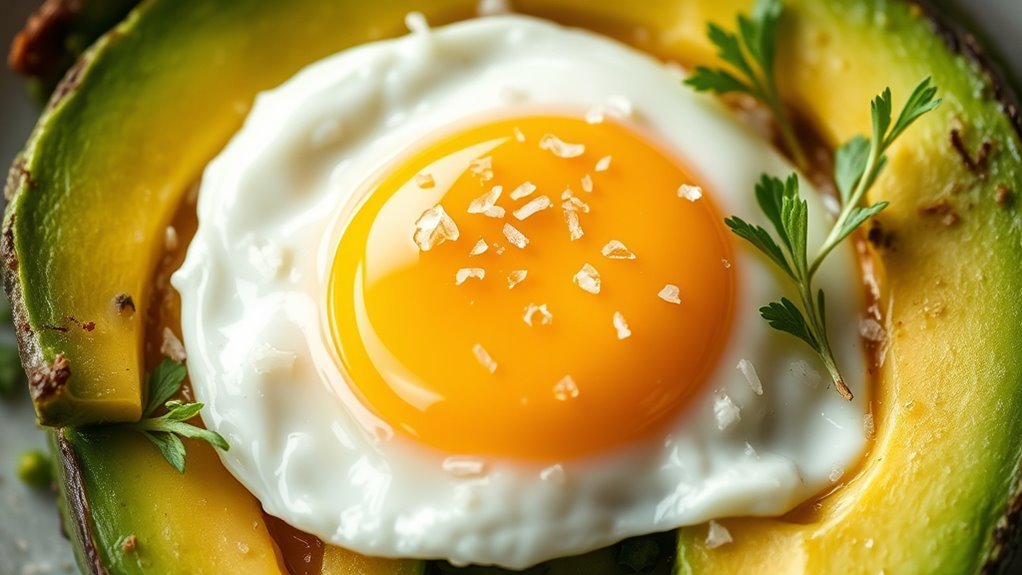Yes, eggs are an excellent choice on the ketogenic diet. They’re high in protein and healthy fats while being low in carbohydrates, making them a perfect fit for maintaining ketosis. A single whole egg provides about 6.3g of protein and only 0.6g of carbs, enhancing your nutrient intake. Plus, eggs are versatile for various recipes while helping you feel full. Discover how to effectively incorporate this powerhouse food into your keto meals for maximum benefits.
Understanding the Ketogenic Diet

While many diets focus on calorie restriction or macronutrient balance, the ketogenic diet is distinct in its emphasis on low carbohydrate intake to induce a state of ketosis. This metabolic state compels your body to burn fat for fuel instead of carbohydrates, leading to potential weight loss and improved energy levels. However, it’s essential to address common keto misconceptions, such as the idea that you can’t enjoy a variety of foods. In reality, the ketogenic diet can accommodate diverse dietary preferences, allowing for customization based on individual tastes. By prioritizing healthy fats and proteins, you can still find enjoyment in meals while adhering to keto principles. Understanding this balance empowers you to embrace a lifestyle that suits both your health goals and personal preferences.
Nutritional Profile of Eggs

Eggs are often hailed as a nutritional powerhouse, particularly for those following the ketogenic diet. They come in various egg varieties, each offering unique benefits, and can be prepared using diverse cooking methods. Whether you prefer boiled, scrambled, or poached, eggs consistently provide essential vitamins and minerals.
| Nutrient | Whole Egg (Large) | Egg White (Large) |
|---|---|---|
| Protein (g) | 6.3 | 3.6 |
| Fat (g) | 5.0 | 0.1 |
| Vitamin D (IU) | 41 | 0 |
| Choline (mg) | 147 | 0 |
Incorporating eggs into your meal plan can enhance nutrient intake while aligning with keto principles, making them an excellent choice for your dietary needs.
Macronutrient Breakdown of Eggs

When considering the macronutrient breakdown of eggs, you’ll find a significant protein content that supports muscle maintenance and growth. In addition to protein, eggs are rich in healthy fats while containing minimal carbohydrates, making them an ideal choice for a ketogenic diet. Understanding this balance is essential for optimizing your nutritional intake on keto.
Protein Content in Eggs
Although many people focus on fats in the keto diet, the protein content in eggs plays an important role in maintaining a balanced macronutrient intake. Eggs are a fantastic source of high-quality egg protein, providing about 6 grams of protein per large egg. This protein is complete, containing all nine essential amino acids your body needs for various functions, including muscle repair and immune support. The quality of egg protein is often considered superior to many plant-based sources, making it a staple for those seeking to optimize their nutrition. Incorporating eggs into your diet not only boosts your protein intake but also enhances satiety, helping you feel fuller for longer. This balance is vital when maneuvering the keto lifestyle.
Fat and Carbohydrates Ratio
Incorporating eggs into your keto diet not only boosts protein intake but also provides a favorable macronutrient profile, particularly regarding fats and carbohydrates. Eggs are rich in fat content, making them an excellent choice for those aiming for high-fat, low-carb ratios. Understanding these nutrient ratios can help you optimize meal timing and serving sizes to fit your dietary guidelines.
| Serving Size | Fat Content (g) | Carbohydrates (g) |
|---|---|---|
| 1 Large Egg | 5.0 | 0.6 |
| 2 Large Eggs | 10.0 | 1.2 |
| 3 Large Eggs | 15.0 | 1.8 |
| 4 Large Eggs | 20.0 | 2.4 |
| 5 Large Eggs | 25.0 | 3.0 |
Pairing eggs with low-carb foods enhances your diet while keeping calorie considerations in check.
Health Benefits of Eggs on Keto
When you’re on a keto diet, eggs can offer several health benefits that align well with your nutritional goals. They’re packed with essential nutrients and serve as a great source of healthy fats, which can support energy levels and overall health. Additionally, the protein in eggs plays a vital role in muscle maintenance, making them an excellent choice for those looking to sustain their fitness while following a low-carb lifestyle.
Nutrient Density Benefits
Eggs stand out as a powerhouse of nutrient density, making them an ideal food choice for those following a keto diet. They provide essential vitamins and minerals while being low in carbohydrates. Incorporating various egg varieties can further enhance your nutrient intake. Here are four key benefits of eggs on a keto diet:
- High in Protein: Eggs deliver a complete source of protein, supporting muscle maintenance and growth.
- Rich in Vitamins: They contain vitamins A, D, E, and B12, vital for overall health.
- Mineral Content: Eggs are a good source of selenium, zinc, and iron, supporting immune function.
- Antioxidants: Eggs contain lutein and zeaxanthin, promoting eye health and reducing oxidative stress.
Choosing eggs can greatly enhance your nutrient profile while enjoying the freedom of a keto lifestyle.
Healthy Fats Source
While many diets emphasize low-fat options, the keto diet thrives on healthy fats, and eggs are an excellent source. Packed with monounsaturated fats, eggs provide energy while helping you stay within your macronutrient goals. Different egg varieties, such as organic or pasture-raised, can enhance the nutritional profile, offering higher omega-3 fatty acids and vitamins. You can enjoy eggs using various cooking methods, like poaching, scrambling, or frying in healthy oils, which can further increase their fat content. This versatility not only keeps your meals exciting but also supports a satisfying, low-carb lifestyle. Incorporating eggs into your keto diet guarantees you’re getting quality fats essential for overall health and well-being.
Supports Muscle Maintenance
Incorporating eggs into your keto diet can greatly support muscle maintenance due to their high-quality protein content and essential amino acids. This is vital for muscle recovery and ideal protein synthesis. Here are four ways eggs contribute to your fitness goals:
- Rich Protein Source: Eggs contain all nine essential amino acids, aiding in muscle repair.
- Leucine Content: They’re high in leucine, a key amino acid for stimulating muscle protein synthesis.
- Supports Recovery: Nutrients in eggs help reduce muscle soreness post-exercise, promoting faster recovery.
- Versatile Meal Options: Eggs can be prepared in various ways, making it easier to incorporate them into your daily meals.
How Eggs Fit Into a Keto Meal Plan
When planning a keto meal, you’ll find that eggs are an excellent source of protein and healthy fats, making them a staple in many low-carb diets. With various egg varieties available, such as chicken, duck, and quail, you can choose based on taste preferences and nutritional content. Utilizing different cooking techniques, like scrambling, poaching, or baking, allows you to incorporate eggs into meals creatively while maintaining their keto-friendly benefits. Eggs not only provide essential nutrients but also promote satiety, helping you manage hunger throughout the day. By integrating eggs into your meal plan, you can enjoy versatility and flavor while sticking to your low-carb lifestyle, empowering you to make choices that align with your health goals.
Different Ways to Prepare Eggs
Although eggs can be enjoyed in many ways, the methods you choose can greatly influence their flavor and texture. Here are some popular preparations that fit well into a keto diet:
- Boiled Eggs: Simple and nutritious, they’re perfect for meal prep and snacks.
- Scrambled Eggs: Whip them up with butter or cream for a rich, creamy texture.
- Fried Eggs: Cooked in healthy fats, they offer a delightful crispy edge.
- Egg Muffins: A versatile option, these can be packed with vegetables and cheese for added flavor.
You might also try poached eggs for a delicate touch, or create a savory egg salad, deviled eggs, baked eggs, egg omelets, or various frittata variations to keep your meals exciting and satisfying.
Common Myths About Eggs and Keto
When considering eggs on the keto diet, you might encounter several common myths that could influence your choices. Many people believe that eggs increase cholesterol levels, cause weight gain, and lack nutritional value. Let’s examine these claims to provide clarity about the role of eggs in a ketogenic lifestyle.
Eggs Increase Cholesterol Levels
Many people believe that consuming eggs can considerably raise cholesterol levels, but this notion is largely based on outdated information. Current research shows that dietary cholesterol has a minimal impact on blood cholesterol for most individuals. Here are some key points to examine regarding cholesterol misconceptions:
- Cholesterol Regulation: Your body regulates its cholesterol production based on intake.
- HDL vs. LDL: Eggs can increase HDL (good cholesterol), which benefits heart health.
- Individual Variation: Genetic factors play a significant role in how your body responds to dietary cholesterol.
- Nutrient Density: Eggs are nutrient-rich, offering proteins and vitamins that support overall well-being.
Understanding these points can help you make informed choices about including eggs in your keto diet without fear of elevating cholesterol levels unnecessarily.
Eggs Cause Weight Gain
While some people worry that eating eggs will lead to weight gain, this belief is largely unfounded and based on misconceptions about dietary fats and calorie intake. Eggs are nutrient-dense, providing essential proteins, healthy fats, and vitamins that support overall health. Their high satiety factor can actually aid in weight management by keeping you fuller for longer, reducing the likelihood of overeating. Incorporating eggs into a balanced diet can offer significant benefits without the fear of unwanted weight gain. Instead of focusing solely on calories, consider the quality of your food choices. When you understand egg nutrition, you’ll see that eggs can be a valuable ally in achieving your health goals while enjoying the freedom of delicious meals.
Eggs Lack Nutritional Value
The misconception that eggs lack nutritional value is rooted in outdated dietary beliefs. In reality, eggs are nutrient-dense and offer a wealth of benefits that challenge common nutritional misconceptions. If you’re considering egg alternatives, you might want to rethink your options.
Here are four key nutritional benefits of eggs:
- High-Quality Protein: Eggs provide all essential amino acids, making them a complete protein source.
- Vitamins and Minerals: Rich in vitamins A, D, E, and B12, along with minerals like selenium and phosphorus.
- Healthy Fats: Eggs contain heart-healthy fats, supporting overall health on a keto diet.
- Antioxidants: They provide lutein and zeaxanthin, which are beneficial for eye health.
Embracing eggs can enhance your nutritional intake considerably.
Potential Concerns With Egg Consumption
Although eggs are a staple in the keto diet, potential concerns regarding their consumption warrant careful consideration. First, allergy concerns are significant, as some individuals may experience allergic reactions to egg proteins, leading to symptoms ranging from mild to severe. If you’re considering incorporating eggs into your diet, it’s essential to be aware of any personal sensitivities. Additionally, ethical considerations surrounding egg production can’t be overlooked. Many people are increasingly concerned about the treatment of hens in factory farming, prompting a shift toward free-range or organic options. By understanding these potential issues, you can make informed choices about egg consumption that align with your dietary goals and personal values, ensuring a balanced approach to your keto lifestyle.
Recipes Featuring Eggs for a Keto Diet
Given the nutritional benefits and versatility of eggs, they can be an excellent addition to your keto meal plan. Incorporating eggs into various recipes allows you to enjoy their rich flavors while staying within your macronutrient goals. Here are four keto-friendly egg recipes you might love:
- Egg Salad – Mix boiled eggs with mayonnaise, mustard, and herbs for a creamy, satisfying dish.
- Baked Frittata – Whisk eggs with your favorite low-carb veggies and cheese, then bake until fluffy.
- Deviled Eggs – A classic treat, fill halved hard-boiled eggs with a blend of yolks, mayo, and spices.
- Egg Muffins – Combine beaten eggs with vegetables and meats, then bake in muffin tins for perfect grab-and-go options.
Explore these recipes to enjoy the freedom of delicious keto meals!
Final Thoughts on Incorporating Eggs Into Keto
When you’re looking to optimize your keto diet, incorporating eggs can be a game-changer due to their rich nutrient profile and low carbohydrate content. With various egg varieties—like chicken, duck, and quail—you’ve got plenty of options to keep your meals exciting. Eggs are not just versatile; they’re also a fantastic source of protein and healthy fats, which are vital for maintaining ketosis. Meal timing is important, too; consider having eggs for breakfast to kickstart your day with energy or as a quick snack to curb cravings. Ultimately, adding eggs to your keto lifestyle can enhance your dietary freedom while providing essential nutrients, making them a smart choice for both health and satisfaction.
Frequently Asked Questions about Eggs on the Keto Diet
1. Are eggs suitable for a keto diet?
Yes, eggs are highly suitable for a keto diet. They are low in carbohydrates and rich in healthy fats, making them an excellent choice for maintaining ketosis. One large egg contains about 0.6 grams of carbs, which fits well within the daily carb limits of a ketogenic diet.
2. How many eggs can I eat on a keto diet?
There is no strict limit on the number of eggs you can eat on a keto diet, but moderation is key. Many people consume 2 to 6 eggs per day, depending on their overall dietary needs and preferences. It’s important to balance egg consumption with other sources of protein and fats to ensure a well-rounded diet.
3. What are the nutritional benefits of eggs on a keto diet?
Eggs are packed with essential nutrients, making them a powerhouse food on the keto diet. They are an excellent source of high-quality protein, healthy fats, vitamins (like B12 and D), and minerals (like selenium and choline). The fats in eggs help keep you satiated, while the protein supports muscle maintenance and repair.
4. Can I eat eggs every day on a keto diet?
Yes, you can eat eggs every day on a keto diet, as long as they fit within your overall macronutrient targets. Eggs are nutrient-dense and versatile, making them easy to incorporate into various meals. However, it’s advisable to include a variety of other foods to ensure you receive a broad spectrum of nutrients.
5. Are there any risks associated with eating eggs on a keto diet?
For most people, eggs are safe and healthy to eat in moderation. However, some individuals may be allergic to eggs or have specific dietary restrictions that limit their consumption. Additionally, there is some debate about the impact of dietary cholesterol from eggs on heart health. If you have concerns about cholesterol or heart disease, it’s best to consult a healthcare professional before making eggs a staple in your diet.
References
- https://www.healthline.com/nutrition/keto-diet-foods#foods-to-eat
- https://www.ncbi.nlm.nih.gov/pmc/articles/PMC6280521/
- https://www.webmd.com/diet/obesity/ss/slideshow-keto-diet
- https://www.ketogenic-diet-resource.com/eggs-on-the-keto-diet.html
- https://www.mayoclinic.org/healthy-lifestyle/nutrition-and-healthy-eating/expert-answers/keto-diet/faq-20452521
- https://www.verywellfit.com/what-foods-are-on-the-keto-diet-5188626
- https://www.bbcgoodfood.com/howto/guide/what-keto-diet
- https://www.cdc.gov/healthyweight/assessing/bmi/adult_bmi/english_bmi_calculator/bmi_calculator.html


